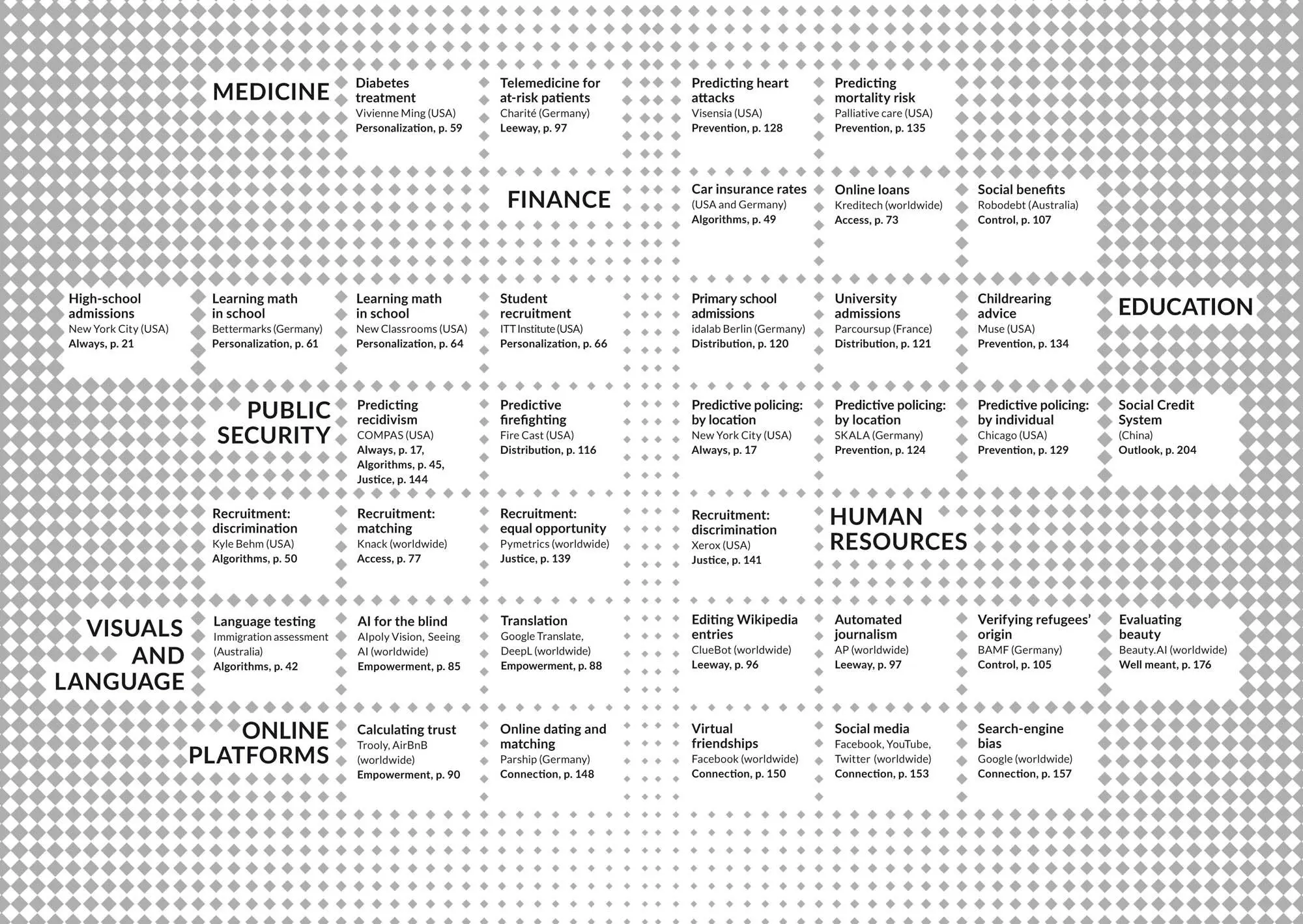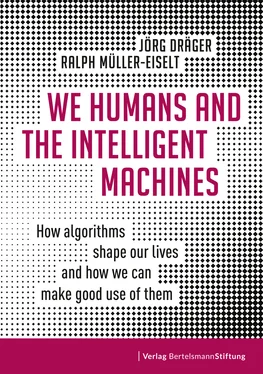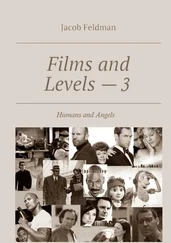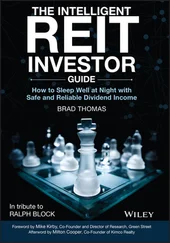Our book was originally published in the spring of 2019 in German. Since the topic is global and since we received a lot of interest from abroad, we decided to follow up with this English translation. Consequently, it was carried out by the artificially intelligent translation software DeepL, enriched by some editing. We hope that the outcome of this machine-human collaboration enables a broader community to build upon our thinking.
We Humans and the Intelligent Machines looks at the great challenges caused by the Algorithmic Revolution through the lens of the common good – independently and impartially, but by no means apolitically. Like the Bertelsmann Stiftung’s Ethics of Algorithms project ( www.ethicsofalgorithms.org), we want to raise awareness of upcoming changes, structure the debate, develop solutions and help to initiate their implementation. In doing so, we are guided by a clear precept: The motivation to take action must not be triggered by what is technically possible, but by what is socially meaningful. This book is intended to encourage you to take up this notion and get involved. It remains up to us to ensure algorithms and AI are here to serve humanity.

The algorithmic world
“In short, success in creating effective AI could be the biggest event in the history of our civilization, or the worst. We just don’t know.” 1
Stephen Hawking, physicist (1942–2018)
December 11, 2017. It is the day the New York City Council reclaims its right to self-determination. 2For the 8.6 million residents of the US metropolis, it is an important victory to ensure that the algorithms used there will become more transparent. As a result, New Yorkers are perhaps the world’s first citizens to have the right to know where, when, how and according to which criteria they are governed by machines. The man who leads the fight is James Vacca – a Bronx Democrat who heads the Committee on Technology during his third and final term as a member of the City Council. The law to be passed today will become part of his political legacy, and its significance could potentially extend far beyond New York and the United States.
“We are increasingly governed by technology.” 3With this sentence, Vacca begins his speech introducing the bill. By “we” the 62-year-old means the citizens of the city but also himself and his fellow City Council members. New York’s public administrators have been using algorithms for some time and in a wide variety of areas: law enforcement, the judiciary, education, fire protection, social transfers – all with very little transparency. Neither the public nor their elected representatives know which data are fed into the algorithms and how they are weighted. In such situations, it is just as difficult for citizens to object to automated decisions taken by the authorities as it is for elected representatives to exercise political control. Vacca fights against this lack of transparency, wanting every office that uses algorithms to be accountable to the City Council and to the public. He wants to shed light on the black box of the algorithmic society.
Much has changed since Vacca first began working nearly 40 years ago. At the beginning of his career, letters were written on typewriters. When they were to be replaced by computers, he thought it was a waste of money. Vacca is anything but a digital native. But he is not a digital naive either. Through his work for the Committee on Technology, he knows to what extent computer-based decisions affect the daily lives of New Yorkers: Police officers patrol on the basis of machine-generated crime forecasts, students are assigned to their secondary schools by computers, social welfare payments are checked by software, and pretrial detention is imposed on the basis of algorithmically calculated recidivism rates. In principle, Vacca has no objection to that. Yet he wants to understand how these decisions are made.
Vacca was irritated by the lack of openness in administrative procedures as early as the 1980s. At the time, he was annoyed by what he considered a shortage of personnel at the Bronx police station which he oversaw as district manager. When he turned to the relevant government agency, he was told that the crime rate in his district was too low for more policemen. The underlying formula used to calculate the rate, however, was not given to him. Therefore, he could neither understand nor question the quota, nor take action against it.
Vacca wanted more transparency. In August 2017, he presented the first version of the bill to the City Council. It would have required all public authorities to disclose the source code for their algorithms. Yet the experts put the brakes on during the Committee on Technology hearing: The subject area is still too unknown, they said. Too much transparency would endanger public safety, make the systems vulnerable to hackers and violate software manufacturers’ intellectual property.
Vacca had to make concessions. A commission of academics and experts was set up to draft rules, due by the end of 2019, on how City Council members and the public will be informed about such automated decisions. Vacca was nevertheless satisfied because the commission has a clearly defined mandate: “If machines, algorithms and data determine us, they must at least be transparent. Thanks to the transparency law, we will have a better overview and understanding of algorithmic decision-making, and we will be able to make agencies accountable.” 4The trend towards more openness and regulation seems unstoppable.
The legislative initiative has already stimulated a number of changes. The use of algorithms is now on New York’s public agenda – in the City Council, in the media, among the city’s residents. Algorithms are a political issue. A debate is taking place about what they are used for. And they are already used very broadly.
It is not only 911 emergency calls but also computer messages that send New York police officers out on their next assignment. 5No crime has occurred at the scene assigned to the police by the software. According to the automated data analysis, however, the selected area is likely to be the site of car theft or burglary in the next few hours – crimes that could be prevented by increased patrols.
Algorithms are managing law enforcement activities. In the 1990s, New York City was notorious for its high crime rate and gangsterism. Within one year, 2,000 murders, 100,000 robberies and 147,000 car thefts took place. New York was viewed as one of the most dangerous cities in the world. Politicians reacted. Under the slogan “zero tolerance,” tougher penalties and higher detection rates were meant to make clear: Crime does not pay.
But what if modern technology could be used to prevent crime before it even occurs? The New York police force also considered this, although it initially sounded like science fiction. The Spielberg thriller Minority Report , based on the short story by Philip K. Dick, played the idea through in 2002: In a utopian society, serious crimes no longer happen because three mutants have clairvoyant abilities and reliably report every crime – a week before it is committed. Potential offenders are detained. Chief John Anderton, played in the movie by Tom Cruise, leads the police department and is proud of its results until one day his own name is spat out by the system. He is now considered a murderer-to-be and desperately tries to prove his innocence.
Читать дальше













